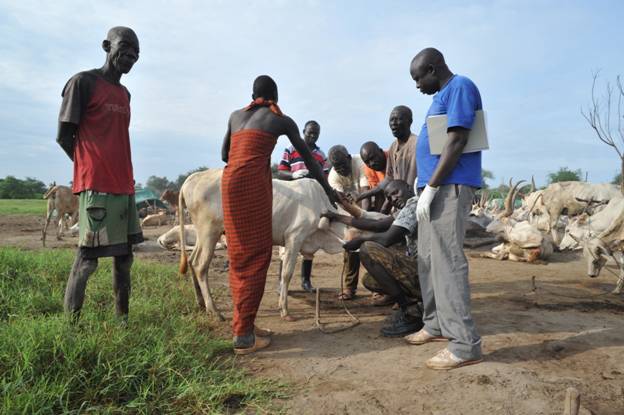UN seeks funds to cope with cattle disease in Jonglei
March 1, 2013 (BOR) – The United Nations Food and Agriculture Organization (FAO) is seeking additional funds from donors in order to support its work limiting the spread of Haemorrhagic Septicaemia and treating infected cattle.

The FAO predicts the disease is likely to spread to other areas if not prevented and contained with vaccination and treatment programmes. The disease is posing a serious threat to household food and nutrition security.
The UN body has begun responded to a recent outbreak of Haemorrhagic Septicaemia (HS) in Twic East, Duk and Bor Counties, Jonglei State, FAO official has said today.
Some 2,500 cattle are estimated to have died of the disease in the first two months of 2013.
“The mortality from HS is very apparent in some cattle camps in Jonglei” stated Dr. Sue Lautze, the head of the FAO in South Sudan, who just returned from a visit to the affected counties.
In January 2013, Mary Gordon, the Jonglei State Acting Director General of the Ministry of Livestock and Fisheries, requested FAO’s assistance to respond to an outbreak of HS in Lith payam [district] in Twic East county.
The FAO official said that they had responded quickly, mobilising partners and resources, ensuring that 20,000 vaccine doses were sent to Bor, Twic East and Duk counties. In February, FAO supplied an additional 60,000 vaccine doses, as well 600 doses of Oxytetracycline to treat infected cattle, according to Lautze.
To date, officials administering the vaccine from the Jonglei state ministry of animal resources and fisheries, FAO and Veterinarians Sans Frontieres (Germany) have reached more than 50,000 cattle of the 100,000 targeted for vaccination. Blood samples have been taken from a number of cattle in the three counties. The results of this analysis will be known next week, and response strategies will be adjusted accordingly, Lautze added.
Haemorrhagic Septicaemia (HS), which is endemic to South Sudan, is a bacterial disease that affects the respiratory system in cattle. Once infected, cattle experience swelling around the neck and restricted breathing. Infected animals suffer a very high mortality rate if not treated in time, dying within two to three days.
A range of events including extreme weather conditions, migration, or poor nutrition can trigger outbreaks.
(ST)
